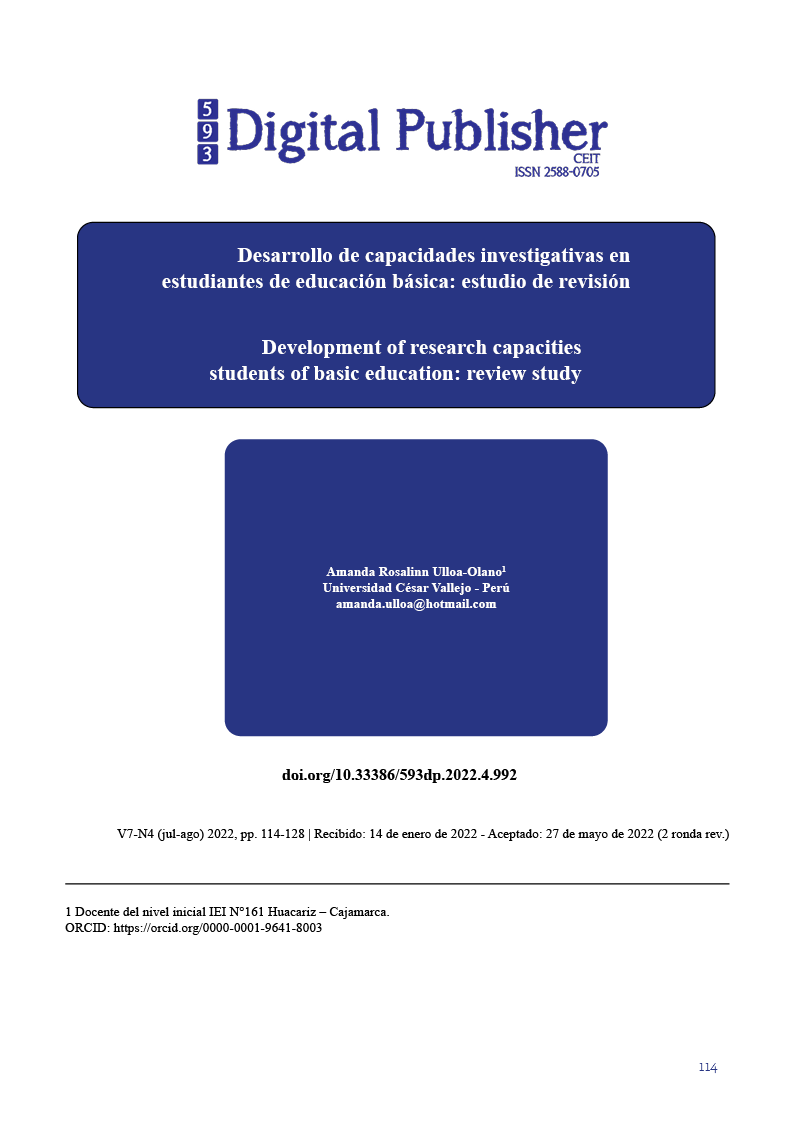Development of research capacities students of basic education: review study
Main Article Content
Abstract
The globalized world demands trained professionals not only theoretically, but who demonstrate analysis, synthesis, reflection and research skills, among others; For this reason, it is necessary in the formation of the student to develop investigative capacities, which are presented from basic education so that they accompany him throughout his training and are established as part of his daily life. In this sense, the purpose of this investigation lies in the exploration of various scientific articles, as well as their contributions, in addition to determining to what extent the acquisition of investigative skills has impacted the development of students. Therefore, the methodology used was a systematic review of research on the subject, applying induction, analysis, synthesis, and deduction; Accordingly, 40 articles were selected from databases such as: Dialnet, Redalyc, Scielo, Scopus, Web of Science, Springer and ScienceDirect, using the PRISMA flowchart. Finally, the investigation showed that the development of investigative skills in basic education students promotes attachment to knowledge and participation in the search for solutions to problems in their sociocultural environment; In addition, investigative capacities are presented transversally in all areas of knowledge that the student must develop throughout basic education.
Downloads
Article Details

This work is licensed under a Creative Commons Attribution-NonCommercial-ShareAlike 4.0 International License.
1. Derechos de autor
Las obras que se publican en 593 Digital Publisher CEIT están sujetas a los siguientes términos:
1.1. 593 Digital Publisher CEIT, conserva los derechos patrimoniales (copyright) de las obras publicadas, favorece y permite la reutilización de las mismas bajo la licencia Licencia Creative Commons 4.0 de Reconocimiento-NoComercial-CompartirIgual 4.0, por lo cual se pueden copiar, usar, difundir, transmitir y exponer públicamente, siempre que:
1.1.a. Se cite la autoría y fuente original de su publicación (revista, editorial, URL).
1.1.b. No se usen para fines comerciales u onerosos.
1.1.c. Se mencione la existencia y especificaciones de esta licencia de uso.
References
Álvarez, L., Ponce, D., Reyes, M., y Campuzano, C. (2022). La formación de habilidades investigativas en estudiantes de bachillerato. Caso INSUTEC. Revista Conrado, 18(85), 100-108.
https://conrado.ucf.edu.cu/index.php/conrado/article/download/2265/2195/
Andrés, M., Rodríguez, C., Pazmiño, F., y Mero, M. (2022). Web 2.0 technologies training processes: training program to promote professor’s knowledge and skills. Formación universitaria, 15(1), 127-134. https://dx.doi.org/10.4067/S0718-50062022000100127
Arroyave, L., Arboleda, W. y Restrepo, S. (2019). El rendimiento escolar y el uso de videojuegos en estudiantes de básica secundaria del municipio de La Estrella- Antioquia. Revista Educación, 43(2). https://www.redalyc.org/articulo.oa?id=44058158011
Atit, K., et al. (2020). Examining the Role of Spatial Skills and Mathematics Motivation on Middle School Mathematics Achievement. https://doi.org/10.31234/osf.io/xgkep
Barbachán, E., Pareja, L., Rojas, A., y Castro, L. (2020). Desempeño docente y habilidades investigativas en estudiantes de instituciones públicas peruanas. Conrado, 16(74), 93-98. http://scielo.sld.cu/scielo.php?pid=S1990-86442020000300093&script=sci_arttext&tlng=en
Barón Pinto, L. (2020). Formación temprana en investigación: Una necesidad en Colombia y América Latina. Revista Oratores, (10), 28–45. https://doi.org/10.37594/oratores.n10.312
Bruthers, C., Hedman, E., y Matyas, M. (2021). Undergraduate research programs build skills for diverse students. Advances in Physiology Education, 45(2), 399–408. https://doi.org/10.1152/advan.00165.2020
Borda, N. (2021). Desarrollo de las habilidades científicas en niños preescolares. Revisión sistemática. https://repositorio.ucv.edu.pe/handle/20.500.12692/58966
Cohen, D., Renken, M., y Calandra, B. (2017). Urban Middle School Students, Twenty-First Century Skills, and STEM-ICT Careers: Selected Findings from a Front-End Analysis. TechTrends, 61(4), 380–385. https://doi.org/10.1007/s11528-017-0170-8
Coşkun, T., y Deniz, F. (2021). The contribution of 3D computer modeling education to twenty-first century skills: self-assessment of secondary school students. International Journal of Technology and Design Education. https://doi.org/10.1007/s10798-021-09660-y
Cowan, K., et al. (2021). Children’s Digital Play during the COVID-19 Pandemic: insights from the Play Observatory. Je-LKS: Journal of e-Learning and Knowledge Society, 17(3), 8-17. https://acortar.link/FEqT48
Del Valle, L., y Mejía, L. (2016). Desarrollo de competencias científicas en la primera infancia. Un estudio de caso con los niños y niñas de educación preescolar, grado Transición, de la Institución Educativa Villa Flora, de la ciudad de Medellín. Íkala, Revista de Lenguaje y Cultura, 21(2). https://doi.org/10.17533/udea.ikala.v21n02a07
Fang, G., Chan, P., y Kalogeropoulos, P. (2021). The Effects of School-to-School Collaboration on Student Cognitive Skills: Evidence from Propensity Score Analysis. The Asia-Pacific Education Researcher. https://doi.org/10.1007/s40299-020-00549-3
Farfán, A. (2021). El uso del Archivo Regional del Cusco y su incidencia en la capacidad investigativa de los estudiantes de la escuela profesional de historia de la Universidad Nacional de San Antonio Abad del Cusco, 2018. https://repositorio.usmp.edu.pe/bitstream/handle/20.500.12727/7510/farf%C3%A1n_za.pdf?sequence=1&isAllowed=y
Gans, J., Murray, F., y Stern, S. (2017). Contracting Over the Disclosure of Scientific Knowledge: Intellectual Property and Academic Publication. https://doi.org/10.3386/w19560
Gever, V. C., Tunca, E. A., Boluwatife, A. A., Nwogbo, V. C., Chinweobo-Onuoha, B. N., Ugwuoke, J. C., y Talabi, F. O. (2021). Visual media and learning: Effect of interactive television instruction as an intervention strategy for improving the critical thinking skills and disposition of out-of-school nomadic children in Nigeria. Learning and Motivation, 76, 101767. https://doi.org/10.1016/j.lmot.2021.101767
Hava, K., y Koyunlu Ünlü, Z. (2021). Investigation of the Relationship Between Middle School Students’ Computational Thinking Skills and their STEM Career Interest and Attitudes Toward Inquiry. Journal of Science Education and Technology, 30(4), 484–495. https://doi.org/10.1007/s10956-020-09892-y
Hoang, C. H., y Dang, T. T. D. (2021). A Sociocultural Perspective on Scholars Developing Research Skills via Research Communities in Vietnam. Minerva, 60(1), 81–104. https://doi.org/10.1007/s11024-021-09454-5
Hsu, F.-H., Lin, I.-H., Yeh, H.-C., y Chen, N.-S. (2022). Effect of Socratic Reflection Prompts via video-based learning system on elementary school students’ critical thinking skills. Computers & Education, 183, 104497. https://doi.org/10.1016/j.compedu.2022.104497
Huth, K. (2021). Using the pedagogy of thinking skills in Christian studies lessons in primary school years 4–6: the teacher’s perspective. Journal of Religious Education, 69(1), 145–160. https://doi.org/10.1007/s40839-020-00130-6
Larsen, F., y Dammeyer, J. (2020). The relation between sensory loss and communicative and cognitive development in children with congenital deafblindness. British Journal of Visual Impairment, 39(2), 104–116. https://doi.org/10.1177/0264619620913901
Mack, B. (2021). Naba Asma’u: A Model for the Contemporary Nigerian Sufi Women Scholars. African American Studies Center https://doi.org/10.1093/acref/9780195301731.013.48297
Maddens, L., Depaepe, F., Janssen, R., Raes, A., y Elen, J. (2019). Evaluating the Leuven Research Skills Test for 11th and 12th Grade. Journal of Psychoeducational Assessment, 38(4), 445–459. https://doi.org/10.1177/0734282918825040
Maddens, L., Depaepe, F., Janssen, R., Raes, A., y Elen, J. (2020). Research skills in upper secondary education and in first year. Educational Studies, 47(4), 491–507. https://doi.org/10.1080/03055698.2020.1715204
Meléndez Rojas, R. E. (2017). Prospectiva para la educación costarricense. Una oportunidad de transformar el sistema educativo para el Siglo XXI. Actualidades Investigativas en Educación, 17(3), 720-744. http://dx.doi.org/10.15517/aie.v17i3.29072
Merchán Naranjo, J. D. (2021). Educando en crisis: estudio de las prácticas docentes para implementar los currículos para la emergencia (Investigaciones). https://repositorio.uasb.edu.ec/handle/10644/8276
Miedijensky, S., Sasson, I., y Yehuda, I. (2021). Teachers’ Learning Communities for Developing High Order Thinking Skills—A Case Study of a School Pedagogical Change. Interchange, 52(4), 577–598. https://doi.org/10.1007/s10780-021-09423-7
Ministerio de educación del Perú (2022). El Perú en PISA 2018: informe nacional de resultados. http://repositorio.minedu.gob.pe/handle/20.500.12799/7725
Ministerio del Poder Popular para la Educación. (2007). Currículo nacional bolivariano. Diseño curricular del sistema educativo bolivariano. Educere, 11(39), 753-775.
Mount, D., y Mazerolle, L. (2021). Acquiring Core Investigative Interviewing Skills in Police Academy Training. Policing: A Journal of Policy and Practice, 15(3), 1773–1789. https://doi.org/10.1093/police/paab017
Nakamura, P., Rivero, C., y Velasco, A. (2019). Eveloping research competencies in education students through situated learning. Aula de Encuentro, 21(1), 182-197. https://doi.org/10.17561/ae.v21i1.10
Oonk, C., Gulikers, J., den Brok, P., y Mulder, M. (2022). Stimulating boundary crossing learning in a multi-stakeholder learning environment for sustainable development. International Journal of Sustainability in Higher Education, 23(8), 21–40. https://doi.org/10.1108/ijshe-04-2021-0156
Oquendo, S. P. (2019). Strategy for the development of research competence in basic primary students/ Estrategia para el desarrollo de la competencia investigativa en estudiantes de básica primaria. REVISTA ENCUENTROS, 17(02). https://doi.org/ 10.15665/encuent.v17i02.2020
Palomino Noa, W. (2018). Orientaciones para la enseñanza del área curricular de Ciencia y Tecnología: guía para docentes de Educación Primaria. http://disde.minedu.gob.pe/handle/20.500.12799/6399
Pahl, A., y Tschiesner, R. (2021). What Influences Attitudes and Confidence in Teaching Physics and Technology Topics? An Investigation in Kindergarten and Primary-School Trainee Teachers. Sustainability, 14(1), 87 https://doi.org/10.3390/su14010087
Pástor, D., Arcos, G., y Lagunes, A. (2020). Desarrollo de capacidades de investigación para estudiantes mediante el uso de estrategias instruccionales en entornos virtuales de aprendizaje. Apertura. https://doi.org/10.32870/ap.v12n1.1842
Pérez, P. (2017). Estrategia didáctica basada en el uso de habilidades investigativas para promover el interés por el estudio. UCV-HACER. Revista de Investigación y Cultura, 6(1),14-19. https://www.redalyc.org/articulo.oa?id=521758009002
Pigolkin, Y. I., Lomakin, Y. V., y Leonova, E. N. (2018). The significance of student competitions for the development of motivation for education and the acquisition of professional competences in the students the Department of Forensic Medical Expertise. Sudebno-Meditsinskaya Ekspertiza, 61(1), 65. https://doi.org/10.17116/sudmed201861165-68
Pires, B. I. da S., y Colombo Junior, P. D. (2021). A escola vai ao museu(!)(?): um olhar de coordenadores pedagógicos e da gestão educacional de Uberaba, Minas Gerais. Acta Scientiarum. Education, 44, e53678. https://doi.org/10.4025/actascieduc.v44i1.53678
Psycharis, S., y Kallia, M. (2017). The effects of computer programming on high school students’ reasoning skills and mathematical self-efficacy and problem solving. Instructional Science, 45(5), 583–602. https://doi.org/10.1007/s11251-017-9421-5
Quiñones, D., Corrales, N. y Silva, N. (2019). Metodología para el desarrollo de las habilidades metacognitivas de los escolares primarios. Revista UNIANDES Episteme, 6(3), 423-437.
Reiban Barrera, R. E. (2018). Las competencias investigativas del docente universitario. Revista Universidad y Sociedad, 10(4), 75-84. https://rus.ucf.edu.cu/index.php/rus/article/view/980
Risco, N. (2019). Indagación científica en el nivel inicial. Universidad Nacional de Tumbes. http://repositorio.untumbes.edu.pe/handle/20.500.12874/1426
Rodriguez, A., Posso, R., Cueva, R. (2018). Herramientas metodológicas para el desarrollo de habilidades investigativas en los estudiantes: una praxis necesaria (Original). Revista científica OLIMPIA, 15(50), 119-132.
Rueda, L., Torres, L. y Cordova, U. (2022). Desarrollo de habilidades investigativas en estudiantes de una institución peruana. Revista Conrado 18.85 (2022): 66-72.
Sánchez Carlessi, H., Romero, C. R., y Mejía Sáenz, K. (2018). Manuel de términos en investigación científica, tecnológica y humanística. Angewandte Chemie International Edition. http://repositorio.urp.edu.pe/handle/URP/1480.
Santiago, J. (2018). Unidad didáctica en CLIL para el fortalecimiento de conceptos básicos sobre el átomo. http://repository.pedagogica.edu.co/handle/20.500.12209/11289
Schrum, K., y Bogdewiecz, S. (2021). Cultivating research skills through scholarly digital storytelling. Higher Education Research y Development, 1–13. https://doi.org/10.1080/07294360.2021.2010667
Sepúlveda, Felipe, y Cáceres Sandoval, Mariela Elizabeth, y Rodríguez, Cristina (2020). Estandarización del Instrumento EGMA para la evaluación de habilidades numéricas iniciales en estudiantes de educación básica de Chile. Estudios Pedagógicos, 46(1),301-318. https://www.redalyc.org/articulo.oa?id=173565056018
Stagias, I., y Retalis, S. (2020). Secondary school students build multiple skills in evaluating business opportunities via technology-enhanced learning activities. Entrepreneurship Education, 3(2), 197–214. https://doi.org/10.1007/s41959-020-00026-4
Tseng, S.-S. (2019). Using Concept Mapping Activities to Enhance Students’ Critical Thinking Skills at a High School in Taiwan. The Asia-Pacific Education Researcher, 29(3), 249–256. https://doi.org/10.1007/s40299-019-00474-0
Ufer, S., y Bochnik, K. (2020). The Role of General and Subject-specific Language Skills when Learning Mathematics in Elementary School. Journal Für Mathematik-Didaktik, 41(1), 81–117. https://doi.org/10.1007/s13138-020-00160-5
Uzcátegui, L. M. (2021). Intervención Educativa de Estrategias Tecnológicas para Potenciar las Capacidades Investigativas. Revista Scientific, 6(22), 291–310. https://doi.org/10.29394/scientific.issn.2542-2987.2021.6.22.15.291-310
Villasis, M., Rendón, M., García, M., y Miranda, M. (2020). La revisión sistemática y el metaanálisis como herramientas de apoyo para la clínica y la investigación. Revista alergia México, 62-72. https://doi.org/10.29262/ram.v67i1.733
Wahler, E. (2019). Improving Student Receptivity to Research by Linking Methods to Practice Skills. Journal of Teaching in Social Work, 39(3), 248–259. https://doi.org/10.1080/08841233.2019.1611693
Yildiz , H. (2018). The Effects of Using Different Tools in Programming Teaching of Secondary School Students on Engagement, Computational Thinking and Reflective Thinking Skills for Problem Solving. Technology, Knowledge and Learning, 25(1), 179–195. https://doi.org/10.1007/s10758-018-9391-y
Zapata, J. (2020). La investigación en el aula como estrategia de cambio en las instituciones educativas. Conrado, 16(76). http://scielo.sld.cu/scielo.php?script=sci_arttext&pid=S1990-86442020000500095&lng=es&tlng=es.
Zárate, A. (2020). Proyecto de investigación para la elaboración de un sistema de estrategias didácticas para el desarrollo del aprendizaje significativo en los estudiantes de cuarto semestre de la Facultad de Medicina de la Universidad Autónoma de Guerrero en el año 2018. Dilemas Contemporáneos: Educación, Política y Valores. https://doi.org/ 10.46377/dilemas.v34i1.2210


